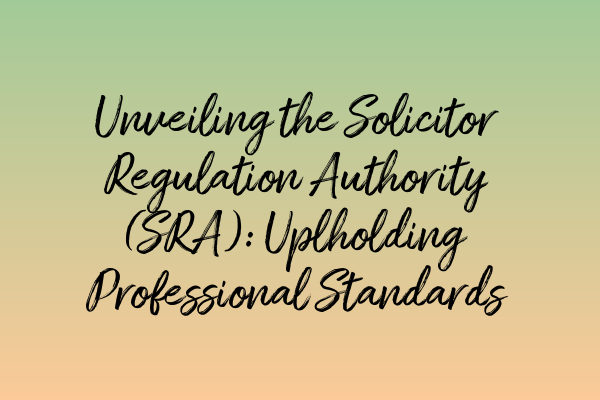Unveiling the Solicitor Regulation Authority (SRA): Upholding Professional Standards
Welcome to this informative blog post that delves into the world of solicitor regulation and the vital role played by the Solicitor Regulation Authority (SRA). As an aspiring solicitor, a comprehensive understanding of the SRA and its commitment to upholding professional standards is crucial for your career success. Let’s explore this topic in detail!
The Significance of the Solicitor Regulation Authority (SRA)
The SRA is the regulatory body responsible for maintaining and enforcing the high standards of professional conduct and ethics within the solicitor profession in England and Wales. Established under the Legal Services Act 2007, it plays a vital role in ensuring that solicitors adhere to the Code of Conduct and uphold the integrity of the legal profession.
Operating independently of the government, the SRA oversees approximately 200,000 solicitors, providing a clear framework of rules and regulations to maintain the highest standards of professionalism, client care, and ethical behavior. This framework ensures that solicitors act in the best interests of their clients and the public, while also promoting equal access to justice and a competitive legal services market.
Key Functions of the SRA
1. Setting Standards: The SRA sets the regulatory framework, outlining the standards expected from solicitors and law firms. This includes defining the requirements for entry into the profession, continuing professional development (CPD), and ensuring compliance with professional obligations.
2. Authorizing and Regulating Solicitors: The SRA is responsible for admitting individuals as solicitors and regulating their professional conduct. It grants licenses and practicing certificates, ensuring that those entering the profession meet the necessary qualifications and character requirements.
3. Handling Complaints and Disciplinary Proceedings: The SRA investigates complaints against solicitors, taking appropriate action when necessary. It has the power to impose disciplinary measures, such as fines, warnings, and, in severe cases, revoking practicing certificates.
4. Protecting Clients: A core function of the SRA is to safeguard the interests of clients. It sets rules for handling client money, maintains a Compensation Fund to protect against financial loss, and provides guidance on professional indemnity insurance to ensure that clients are adequately protected.
Professional Standards and the Code of Conduct
The SRA Code of Conduct is a comprehensive set of rules that govern the ethical and professional behavior of solicitors. It outlines the expectations and responsibilities solicitors have towards clients, the courts, and the public, emphasizing the need for integrity, confidentiality, and high-quality service delivery.
Within the Code of Conduct, solicitors must demonstrate a commitment to various principles, including:
- Honesty and Integrity
- Independence
- Maintaining Public Trust and Confidence
- Acting in the Best Interests of Clients
- Providing a High Standard of Service
Compliance with these professional standards ensures that solicitors uphold the reputation of the legal profession, deliver exceptional services, and maintain the trust of their clients.
Continuing Professional Development (CPD)
The SRA recognizes the importance of ongoing professional development to enhance solicitors’ knowledge and skills. As such, it requires solicitors to undertake regular CPD activities to ensure their competence and keep abreast of developments in the law.
CPD can take various forms, such as attending courses, webinars, workshops, conferences, or engaging in self-directed learning. The SRA emphasizes the importance of maintaining a reflective approach, documenting CPD activities, and actively seeking to close any knowledge gaps.
Keeping Abreast of Regulatory Changes
As a budding solicitor, it is essential to stay informed about regulatory changes and updates from the SRA. This ensures that you remain compliant with the latest standards and best practices, enabling you to provide the highest level of service to your clients.
At Become Solicitor SRA, we strive to keep you updated on all aspects of the legal profession. Here are some related articles you may find useful:
- A Closer Look at the Bar Professional Training Course (BPTC)
- The Role of Technology in Modern Legal Practice
- A Look into Prominent Law Firms in the UK
- Debunking Common Misconceptions about Solicitors
- Networking Strategies for Solicitors: Building a Strong Professional Network
Stay tuned to our blog and be sure to explore these articles to gain further insights into the legal profession!


Leave a Reply